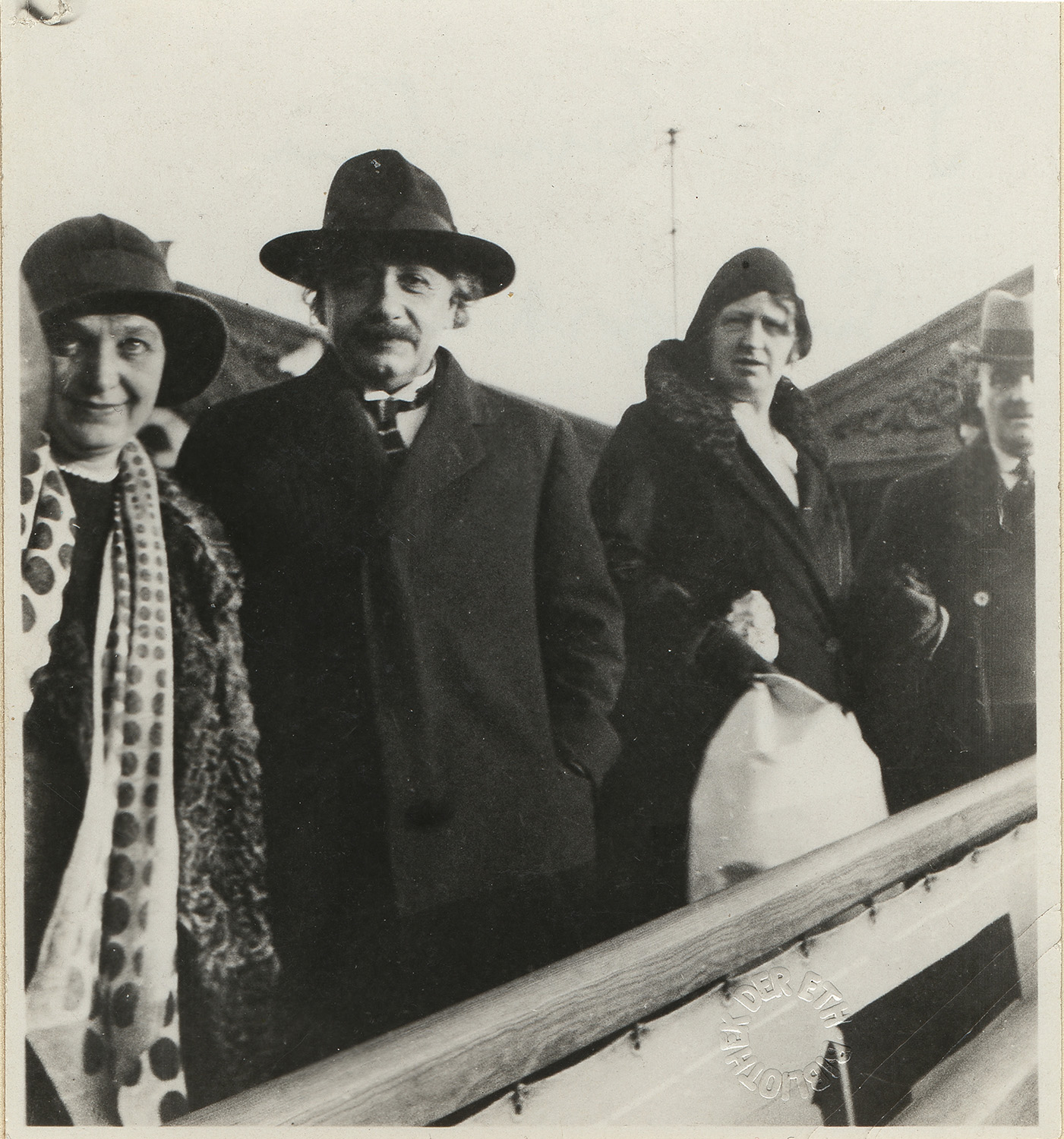Princeton (1933–1955)
The Institute for Advanced Studies in Princeton ( New Jersey) gave Einstein 1933 a post. This newly-founded research organisation saw as its role the promotion of further education by young university graduates, by facilitating unconventional contact with top scientists. Already in 1932, Einstein had assured the head, Abraham Flexner, that he wished to be involved in the project.
He liked the life there, as there too he was free of any teaching- and research obligations. In the mornings he was mostly to be found at the institute. In the afternoons he preferred to be at home, where he met friends and personalities from science and politics.
In 1939 Einstein pointed out the possibility of constructing an atomic bomb to President Roosevelt, and mentioned his fears that Germany, with its aggressive government, could achieve this before the rest of the world. However, his ideas did not have much of an effect. Only in 1941 was the Manhattan Engineering District founded, where the atomic bomb was eventually developed.
Otherwise, he continued work on the generalisation of the theory of gravitation, on which he had been working constantly since 1916. In 1946 he presented his first draft of the field equation for a general field theory and from then on adhered to this basic concept.
In the 1950s he corresponded actively with his first biographer, Carl Seelig, whose private collection of documents from and about Einstein is to be found in the ETH Library (ETH Zurich University Archives).
Einstein died in Princeton on April 18th 1955.
Documents to the time in Princeton (German)
- Download Brief von Albert Einstein an Carl Seelig, 15.11.1947 (PDF, 382 KB)
- Download Brief von Albert Einstein an Carl Seelig, 25.02.1952 (PDF, 564 KB)
- Download Brief von Albert Einstein an Carl Seelig, 11.03.1952 (PDF, 581 KB)
- Download Brief von Albert Einstein an Carl Seelig, 26.03.1952 (PDF, 524 KB)
- Download Brief von Albert Einstein an Carl Seelig, 08.04.1952 (PDF, 462 KB)
- Download Brief von Albert Einstein an Carl Seelig, 20.04.1952 (PDF, 585 KB)
- Download Brief von Albert Einstein an Carl Seelig, 05.05.1952 (PDF, 481 KB)
- Download Brief von Albert Einstein an Carl Seelig, 12.05.1952 (PDF, 391 KB)
- Download Brief von Carl Seelig an Albert Einstein, 07.06.1952 (PDF, 984 KB)
- Download Brief von Albert Einstein an Carl Seelig, 16.07.1952 (PDF, 466 KB)
- Download Brief von Albert Einstein an Carl Seelig, 01.08.1952 (PDF, 414 KB)
- Download Brief von Albert Einstein an Carl Seelig, 20.08.1952 (PDF, 426 KB)
- Download Brief von Carl Seelig an Albert Einstein, 16.08.1952 (PDF, 522 KB)
- Download Brief von Carl Seelig an Albert Einstein, 11.09.1952 (PDF, 526 KB)
- Download Brief von Albert Einstein an Carl Seelig, 15.09.1952 (PDF, 381 KB)
- Download Brief von Albert Einstein an Carl Seelig, 02.11.1952 (PDF, 405 KB)
- Download Brief von Albert Einstein an Carl Seelig, 16.01.1953 (PDF, 463 KB)
- Download Brief von Albert Einstein an Carl Seelig, 25.03.1953 (PDF, 525 KB)
- Download Brief von Albert Einstein an Carl Seelig, 14.09.1953 (PDF, 419 KB)
- Download Brief von Albert Einstein an Carl Seelig, 25.10.1953 (PDF, 386 KB)
- Download Brief von Albert Einstein an Carl Seelig, 04.01.1954 (PDF, 415 KB)
- Download Brief von Albert Einstein an Carl Seelig, 14.04.1954 (PDF, 437 KB)
- Download Brief von Albert Einstein an Carl Seelig, 12.08.1954 (PDF, 431 KB)
- Download Brief von Albert Einstein an Carl Seelig, 31.09.1954 (PDF, 425 KB)
- Download Brief von Carl Seelig an Albert Einstein, 17.02.1955 (PDF, 557 KB)
- Download Brief von Albert Einstein an Carl Seelig, undatiert (PDF, 398 KB)
- Download Brief von Albert Einstein an Carl Seelig, undatiert (PDF, 844 KB)
- Download Brief von Albert Einstein an Carl Seelig, undatiert (PDF, 719 KB)
- Download Brief von Albert Einstein an Carl Seelig, undatiert (PDF, 839 KB)
- Download Brief von Albert Einstein an Carl Seelig, undatiert (PDF, 624 KB)
- Download Brief von Albert Einstein an Carl Seelig, undatiert (PDF, 771 KB)
- Download Brief von Albert Einstein an Carl Seelig, undatiert (PDF, 436 KB)
- Download Physikalische Formeln von der Hand Albert Einsteins, undatiert (PDF, 531 KB)
- Download Brief von Maximilian Pinl an Albert Einstein, 02.05.1933 (PDF, 384 KB)
- Download Brief von Albert Einstein an Erwin Freundlich-Finlay, 26.04.1944 (PDF, 425 KB)
- Download Brief von Albert Einstein an Conrad Habicht, 15.08.1948 (PDF, 517 KB)
- Download Brief Shephard A. Sheinkman an Albert Einstein, 25.10.1949 (PDF, 589 KB)
- Download Brief von Albert Einstein an Jakob Ehrat, 12.05.1952 (PDF, 904 KB)
- Download Brief von Albert Einstein an Arnold Heim, 14.07.1952 (PDF, 401 KB)
- Download Brief von Bruno Italiener an Albert Einstein, 28.02.1953 (PDF, 390 KB)
- Download Brief Norman Thomas an Albert Einstein, 09.03.1954 (PDF, 543 KB)
- Download Brief von Albert Einstein an Carlo Winteler, 10.04.1954 (PDF, 411 KB)


